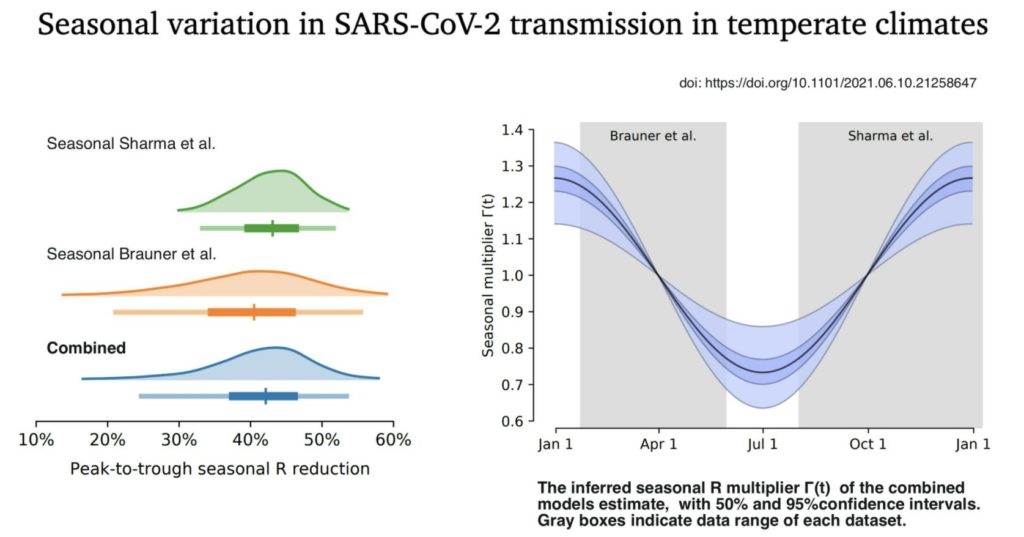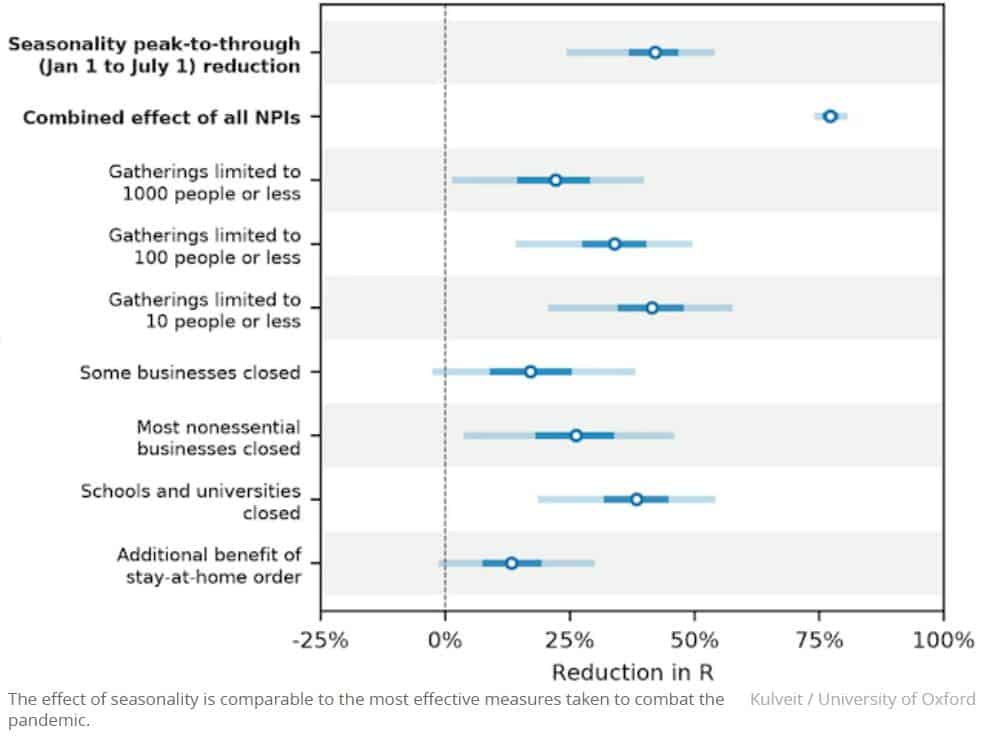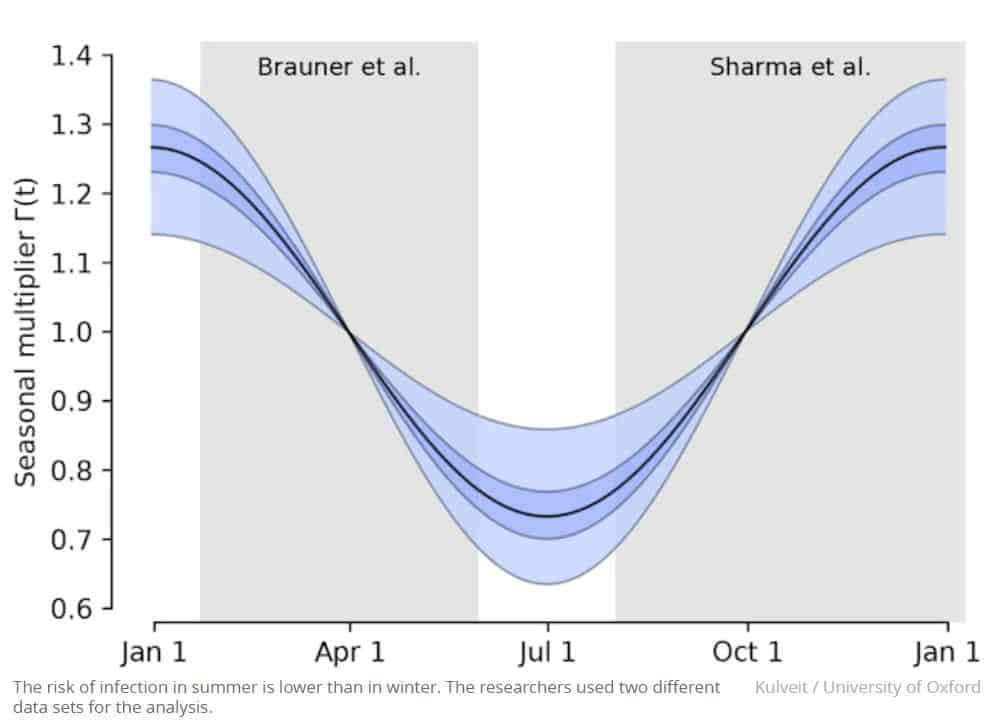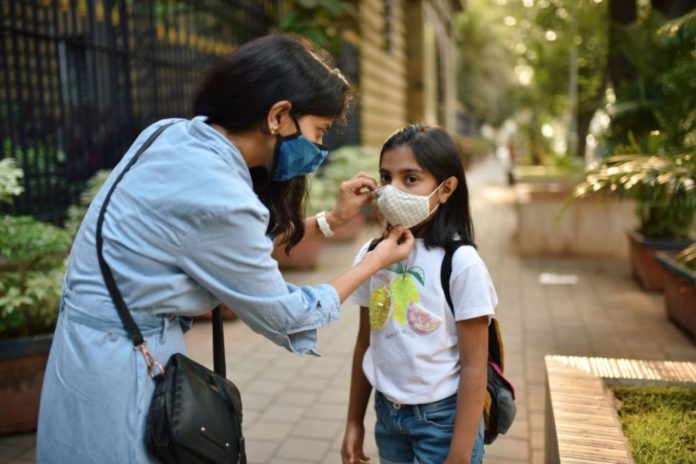When the sun is shining, Corona is no longer that bad – researchers from Oxford have now been able to confirm this thesis. They had investigated the effect of seasonality on the infectivity of Sars-Cov-2. The results partly explain the low number of cases.
The study published by British researchers from Oxford University has found that the coronavirus is significantly less contagious in summer than in winter. This also applies to the mutations such as the significantly more infectious Delta variant.
- Does This Mean We Stopped Being Animal and Started Being Human Due to ‘Copy Paste’ Errors?
- The One Lifestyle Choice That Could Reduce Your Heart Disease Risk By More Than 22%
- Aging: This Is What Happens Inside Your Body Right After Exercise
- Immune-Boosting Drink that Mimics Fasting to Reduce Fat – Scientists ‘Were Surprised’ By New Findings
- Gun Violence in America: What They Don’t Talk About at the Debate
The team around study author Jan Kulveit had analyzed computer models of the spread of epidemics with the help of the “EpidemicForecasting.org” project. To do this, they evaluated the data from a total of 143 regions in Europe and assessed the influence of seasonality on the infection rate.
The researchers presented the results in advance on the “medRxiv” preprint platform.
Infection risk around 40 percent lower
After separating the seasonality factor from other measures such as contact restrictions and the mask requirement, the scientists came to the following conclusion: The risk of infection is around 40 percent lower in summer than in winter. However, they did not identify an exact temperature limit.
“We found a strong seasonal pattern,” writes study author Kulveit on Twitter. The R-value at the height of summer was 42 percent lower than at the height of winter. The current figures should therefore not be interpreted solely as a result of increasing immunity.

In addition, the study found that the seasonality of variants such as Delta could be significantly more pronounced than originally assumed: In summer, the risk of being infected is much lower.
Is SARS-CoV-2 transmission seasonal? In our new preprint, we find a strong seasonal pattern in temperate Europe, consistent with a reduction in R of 42% (95% CI: 25%-53%) from the peak of winter to the peak of summer. Thread???? https://t.co/P62XUv6oCI pic.twitter.com/xVGBxCtst0
— Jan Kulveit (@jankulveit) June 14, 2021
Seasonality alone is not enough
According to the Oxford researchers, the effect of seasonality would be comparable to the most effective measures taken to combat the pandemic. However, their effect is “less than the combination of several measures”.
The researchers therefore emphasize that seasonality alone is not enough to prevent the virus from spreading. If too few people were immune and no action was taken, outbreaks would continue.
“Seasonal differences alone will never push the R value below 1,” explains Kulveit.

Different theories about the summer effect
Researchers do not yet know why the risk of infection is so much lower in summer than in winter. A recent overview study concluded that the data available so far were too contradictory to clearly explain the summer effect. The additional measures taken against the virus would distort the data.
However, this phenomenon is already known from other respiratory infections. There are therefore different theories for Sars-CoV-2:
Initial studies had pointed to factors such as temperature and humidity that prevented aerosol transmission.
“When it gets warm, the coronaviruses usually weaken and the disease weakens. The summer could be our best ally,” said virologist Alexander Kekulé last year.
According to other experts, in addition to warmer temperatures, stronger UV light and drought are “not conducive to virus transmission”.
- Does This Mean We Stopped Being Animal and Started Being Human Due to ‘Copy Paste’ Errors?
- The One Lifestyle Choice That Could Reduce Your Heart Disease Risk By More Than 22%
- Aging: This Is What Happens Inside Your Body Right After Exercise
- Immune-Boosting Drink that Mimics Fasting to Reduce Fat – Scientists ‘Were Surprised’ By New Findings
- Gun Violence in America: What They Don’t Talk About at the Debate
The thesis: UV radiation could break down the RNA in the virus. The pathogen would then no longer be active and therefore no longer able to spread any further.
“The variety of possible causes makes it extremely difficult to separate the various seasonal factors from one another,” explain the researchers with reference to the various theses.
However, the determined reduction in the R-value could explain several of the theories mentioned.

Data apply to Europe only
The strong effect of seasonality provides an explanation for the second wave that many European countries were exposed to in autumn and winter 2020. He also explains why the numbers are now falling significantly, but a renewed increase cannot be ruled out.
However, the scientists point out certain limitations: The fact that the data only relate to Europe and a summer-winter period.
- Does This Mean We Stopped Being Animal and Started Being Human Due to ‘Copy Paste’ Errors?
- The One Lifestyle Choice That Could Reduce Your Heart Disease Risk By More Than 22%
- Aging: This Is What Happens Inside Your Body Right After Exercise
- Immune-Boosting Drink that Mimics Fasting to Reduce Fat – Scientists ‘Were Surprised’ By New Findings
- Gun Violence in America: What They Don’t Talk About at the Debate
“In other climates, the seasonality is probably different,” writes Kulveit. That explains why variants such as Delta (B.1.617.2) were able to spread in India, even though the temperatures there were above those in Europe, especially in spring.
Image Credit: Getty
